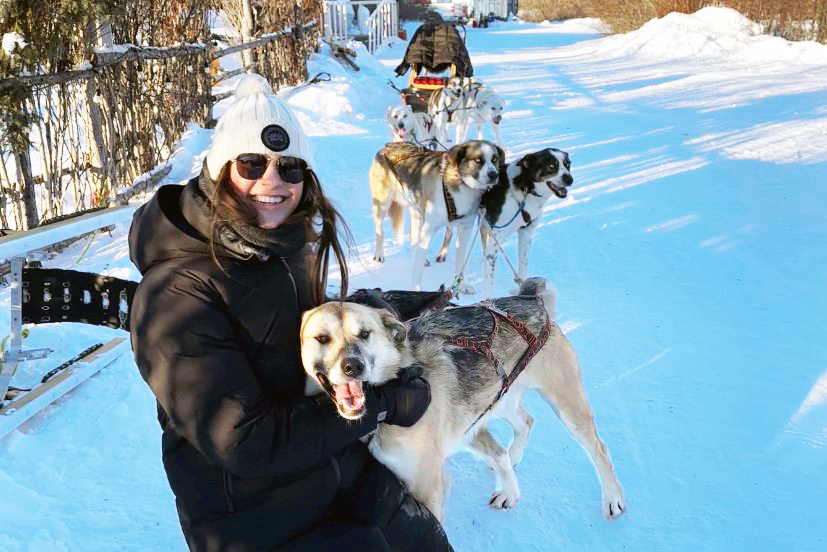
Katherine Hunt gets to know some sled dogs in Churchill, Man.
Rural and remote experiences offer learners unique challenges and opportunities
When the internet goes down and the cell service is out, all you can do is roll with it. Even if you’re in health care.
Katherine Hunt was on a placement in Churchill, Man. when all digital access dropped for about 24 hours.
“There were quite a few changes that were necessary to keep things running in the health clinic and hospital, including switching to paper charting,” said Hunt, in her second year of the Master of Physician Assistant Studies (MPAS) program at the Rady Faculty of Health Sciences.
“It was possible to continue seeing patients that day because everyone was able to work together so efficiently,” she said. “It was amazing to see not only the health care staff but the whole town come together to figure out how to adapt.”
Hunt is one of 1,293 learners who have had placements outside of the perimeter of Winnipeg in the past year through the Rady Faculty’s Office of Rural and Remote Learner Experiences. Learners went to 59 different communities, including 12 First Nations.
“A rural and remote placement provides learners with the opportunity to experience the challenges communities face when accessing equitable health care,” said managing director Melissa Balness. “It also provides a diversity of practice they may not get through placement in an urban centre.”
In addition, learners benefit from the opportunity to build strong relationships with their mentors and to really get to know them and their community. “I’d have to say that my primary preceptor, Dr. Carlos Lara, has left the biggest impression on me more than anybody else,” said Tien Van Le, currently in his first year of the family medicine residency program in Brandon, Man. “I never really gave much serious thought to family medicine as my primary specialty until I started working with him.”
Le recalled one patient who made a big impression. “She had been going through a series of significant life stressors including passing of a close family member, added work responsibility and increasing panic attacks all within a year,” said Le. “The way that he empathetically approached this patient’s collective stressors impressed me.”
Not only did Le ultimately choose family medicine as his specialty, he hopes to follow in his preceptor’s footsteps. “His type of practice is the ideal type that I strive for when I venture out into independent practice!”
For learners still on the fence about whether to venture into a rural or remote setting, occupational therapy graduate Blake Wall has just one piece of advice. “Do it!”
Not only did the 2023 grad enjoy the diverse experiences, the independence and the close ties with health care staff, but the natural beauty of the area truly took his breath away. “You will find that educators are eager to show off the North to students when they are here on placement,” he said. “I had the opportunity to hear live music, hike, camp, and spend lots of time on the many beautiful lakes here while on placement.”
When he graduated last fall, returning to the North was an easy choice. He now lives and works as an occupational therapist at Flin Flon General Hospital, alongside his former fieldwork educator, Kara Kozar.
“Working in the North allows me to practice as a true generalist, where practicing in cities with larger facilities may narrow my scope of practice considerably,” said Wall. “I think beginning my OT career in the North is the best decision I have made as a new graduate.”






